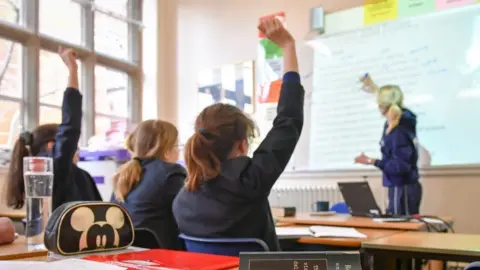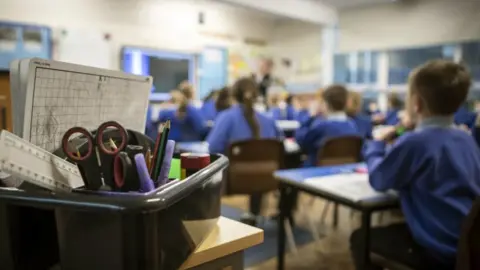Schools could be forced to close amid drop in pupils - think tank
 PA Media
PA MediaSchools in London could lose millions in funding and be forced to close by 2030 due to falling pupil numbers, a think tank says.
Research by the Education Policy Institute (EPI) suggests pupil numbers are projected to fall the most in areas like Lambeth and Lewisham.
The North East is among other areas most affected in England.
The government said it was up to councils and academy trusts to balance school place "supply and demand".
The research follows analysis by London Councils in January that shows demand for school places in the capital is set to plummet.
The cross-party body warned last year factors affecting pupil numbers included a 17% decrease in the birth rate, rising rents and house prices, and the cost of living.
The findings come ahead of primary school offer day in England and Wales on 16 April.
The report said the North East, Yorkshire and the Humber and London were expected to see the largest percentage decrease in pupil numbers by 2030.
At primary level, the analysis estimated the North East will experience the greatest decline in pupil numbers of 12.7% per cent between between the 2022-23 and 2028-29 years.
At secondary level Yorkshire and the Humber, the North East, and London are projected to have the largest falls in pupil numbers during the same period.
Three London boroughs are among areas with the five largest predicted percentage drops in pupil numbers at secondary level - by 18.8% in Lambeth, south London, 12.3% in Lewisham, south-east London, and 10.9% in Camden, north London.
Lambeth is also projected to see England's largest percentage drop in pupil numbers at primary level - by 24.5%.
Schools 'will struggle'
Researchers also used the think tank's own school funding model to analyse the potential impact on school funding.
It revealed that under a scenario where all schools receive a 0.5% real-terms increase in per-pupil funding each year, overall funding for primary and secondary state schools would fall by £1bn by 2030.
It added that all regions are projected to see a decrease in primary school funding between 2023-24 and 2029-30, and the North East could see the largest decrease at 9%.
The report concluded: "Reductions in class sizes do not bring about proportional decreases in staffing costs, school supplies, energy bills and the other day-to-day costs of running a school."
It added that some of "the most severely affected schools will struggle to stay viable" and "will be forced to consider alternatives: mergers with other schools, difficult cost-cutting measures and ultimately school closures".
 PA Media
PA MediaRobbie Cruikshanks from the EPI said the scale of the potential change "presents major policy challenges to future governments".
"Policymakers must carefully consider the impacts of changes to the national funding formula on schools that are most affected by falling pupil numbers, and how best to redistribute any savings created by these falls," he said.
'A catastrophe'
General secretary of the National Association of Head Teachers, Paul Whiteman, expressed similar concerns.
"Schools are already strapped for cash - and even with a dip in pupil numbers, any further cuts to funding would be a catastrophe for our children," he said.
Mr Whiteman argued the drop in pupil numbers should be seen as "an opportunity" for the government to maintain funding and "keep current staffing levels, paving the way for smaller class sizes and targeted support for pupils".
A Department for Education spokesperson stressed the figures were "speculative" and funding was "subject to future spending reviews".
"It is for local authorities and academy trusts to balance the supply and demand of school places, in line with changing demographics, as they have done for many years."
They added: "We are increasing school funding to £60.7bn next year, the highest level ever in real terms per pupil.
"Every school will receive a per-pupil increase in funding, and the national funding formula makes sure that funding is distributed fairly based on the needs of each school and their pupils."

Follow BBC London on Facebook, X and Instagram. Send your story ideas to [email protected]
